|
JULY 3, 3 P.M.—THE CHARGE
Longstreet, who doubted that the attack would succeed, reluctantly
ordered the assault column forward at about 3 P.M., and the nine
Confederate brigades stepped out, guiding on the clump of trees visible
on the ridge 1,400 yards ahead. Herb's division marched straight ahead;
Pickett's had to make successive shifts to the left to close ranks on
Heth's as it approached the Copse of Trees. The Confederate line was a
long one, measuring about a mile from left to right when the assault
began. The ground over which it charged was open but was crossed with
shallow' depressions into which the advancing formations would disappear
briefly from the view of the Union soldiers in their front.
Nevertheless, the Union batteries from Little Round Top to Cemetery Hill
fired on the Confederate lines as soon as they hove into view and
punched gaps in the advancing ranks. In fifteen minutes the attackers
reached the Emmitsburg Road, climbed its fences, and dressed their
lines. By this time the artillery pieces within 400 yards of the
assaulting Confederates were firing canister, and the Union infantry
blasted them with rifle fire. The Confederates closed the gaps created
by the Federal fire, Pickett's men siding to the left, Heth's to the
right, and the mile-long front shrank to a compact one of a half mile
from flank to flank.
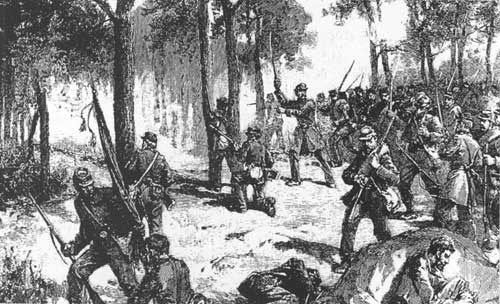
|
WOOD ENGRAVING OF STEUART'S BRIGADE RENEWING THE CONFEDERATE ATTACK ON
CULP'S HILL (BL)
|
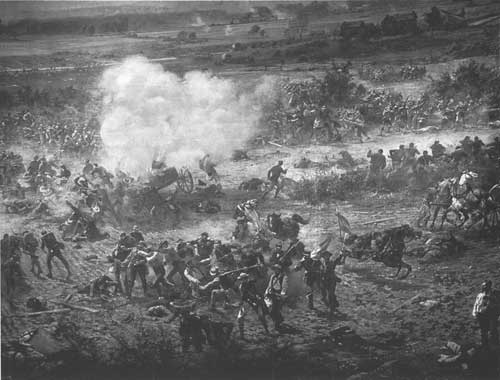
|
THE HIGH-WATER MARK OF THE CONFEDERATE CAUSE WAS REACHED AT THE ANGLE AS
SOUTHERN TROOPS PENETRATED THE UNION LINES BEFORE BEING REPULSED. THIS
PAINTING BY PHILIPPOTEAUX IS PART OF THE GETTYSBURG CYCLORAMA (GNMP)
|
|
PICKETT'S CHARGE; A CONFEDERATE AND UNION PERSPECTIVE
The following account was written by captain Henry T. Owen, 18th
Virginia Infantry, Garnett's Brigade, Pickett's Division. It originally
appeared in the Philadelphia Weekly Press.
The command now came along the line, "Front, forward!" and the column
resumed its direction straight down upon the centre of the enemy's
position. The destruction of life in the ranks of that advancing host
was fearful beyond precedent, officers going down by dozens and the men
by scores and fifties.
We were now four hundred yards from the foot of Cemetery Hill, when
away off to the right, nearly half a mile, there appeared in the open
field a line of men at right angles with our own, a long, dark mass,
dressed in blue, and coming down at a "double-quick" upon the unprotected
right flank of Pickett's men, with their muskets "upon the right
shoulder shift," their battle flags dancing and fluttering in the breeze
created by their own rapid motion, and their burnished bayonets
glistening above their heads like forest twigs covered with sheets of
sparkling ice when shaken by a blast. The enemy were now seen
strengthening their lines where the blow was expected to strike by
hurrying up reserves from the right and left, the columns from opposite
directions passing each other double along our front like the fingers of
a man's two fingers locking together. The distance had again shortened
and officers in the enemy's
lines could be distinguished by their uniforms from the privates. Then
was heard that heavy thud of a muffled tread of armed men that roar and
rush of tramping feet as Armistead's column from the rear closed up
behind the front line and he (the last brigadier) took command, stepped
out in front with his hat uplifted on the point of his sword and led the
division, now four ranks deep, rapidly and grandly across that valley of
death, covered with clover as soft as a Turkish carpet.
There it was again! and again! A sound filling the air above, below,
around us, like the blast through the top of a dry cedar or the whirring
sound made by the sudden flight of a flock of quail. It was grape and
canister, and the column broke forward into a double quick and rushed
toward the stone wall where forty cannon were belching forth grape and
canister twice and thrice a minute. A hundred yards from the stone
wall the flanking party on the right, coming down on a heavy nun,
halted suddenly within fifty yards and poured a deadly storm of musket
balls into Pickett's men, double-quicking across their front, and, under
this terrible cross fire the men reeled and staggered between falling
comrades and the right came pressing down upon the centre, crowding the
companies into confusion. But all knew the purpose to carry the heights
in front, and the mingled mass, from fifteen to thirty feet deep, rushed
toward the stone wall, while a few hundred men, without orders, faced
to the right and fought the flanking party there, although fifty to one,
and for a time held them at bay. Muskets were seen crossed as some
fired to the right, and others to the front and the fighting was
terrific—far beyond all other experience even of Pickett's men, who
for once raised no cheer, while the welkin rang around them with the
"Union triple huzza." The old veterans saw the fearful odds against
them and other hosts gathering darker and deeper still.
The time was too precious, too serious for a cheer; they buckled
down to the heavy task in silence, and fought with a feeling like
despair. On swept the column over ground covered with dead and dying
men, where the earth seemed to be on fire, the smoke dense and
suffocating, the stun shut out, flames blazing on every side, friend
could hardly be distinguished from foe, but the division, in the shape
of an inverted V, with the point flattened, pushed forward, fighting,
falling and melting away, till half way up the hill they were met by a
powerful body of fresh troops, charging down upon them, and this remnant
of about a thousand men was hurled back-out into the clover field.
Brave Armistead was down among the enemy's guns, mortally wounded.
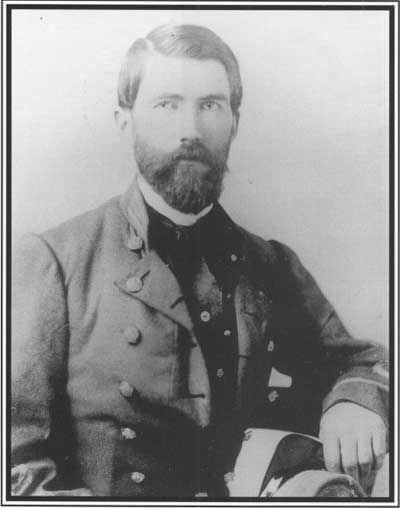
|
CAPTAIN HENRY THWEATT OWEN, COMPANY C, 18TH VIRGNIA INFANTRY (GNMP)
|
Near Gettysburg, July 6, 1863
My Dear Papa,
When our great victory
was just over the exultation of victory was so great that one didn't
think of our fearful losses, but now I can't help feeling a great
weight at my heart. Poor Henry Ropes was one of the dearest fiends I
ever had or expect to have. His loss is terrible. His men actually wept
when they showed me his body, even under the tremendous cannonade, a
time when most soldiers see their comrades dying around them with
indifference.
Indeed with only two officers besides myself remaining, I can't help
feeling a little spooney when I am thinking, & you know I am
not at all a lachrymose individual in general. However I think we can
run the machine. Our losses are of—13 officers, 3 killed, 7
wounded. Of 231 enlisted men, 30 killed, 84 wounded, 3 missing, total
117, with officers, aggregate 127.
The enemy, after a morning of quiet on our part of the line (a
little to the right of the left center) began the most terrific
cannonade, with a converging fire of 150 pieces, that I have ever heard
in my life & kept it up for 2 hours, almost entirely disabling our
batteries, killing & wounding over half the officers & men [of
the artillery] & silencing most of the guns. The thin line of our
division against which it was directed was very well shielded by a
little rut they lay in & in front of our brigade by a little pit,
just one foot deep & one foot high, thrown up hastily by one
shovel, but principally by the fact that it is very difficult to hit a
single line of troops, so that the enemy chiefly threw over us with the
intention of disabling the batteries & the reserves which they
supposed to be massed in the rear of the batteries, in the depression
of the hill.
The rebels thus left us entirely unsupported & advanced with
perfect confidence after ceasing their artillery—our artillery
being so knocked up that only one or two shots were fired into them,
which, however, were very well aimed, & we could see [the shots]
tumble over squads in the rebel lines. Had our batteries been intact,
the rebels would never have got up to our musketry, for they were
obliged to come out of the woods & advance from a half to 3/4 of a
mile over an open field & in plain sight. A magnificent sight it was
too. Two brigades in two lines, their skirmishers driving in ours.
The moment I saw them I knew we should give them Fredericksburg. So
did every body. We let the regiment in front of us get within 100 feet
of us, & then bowled them over like nine pins, picking out the
colors first. In two minutes there were only groups of two or three men
running round wildly, like chickens with their heads off. We were
cheering like mad, when Macy directed my attention to a spot 3 or 4 rods
on our right where there were no pits, only a rail fence, Baxter's
Pennsylvania men had most disgracefully broken, & the rebels were
within our line. The order was immediately given to fall back far enough
to form another line & prevent us [from] being flanked. Without
however waiting for that, the danger was so imminent that I had rushed
my company immediately up to the gap, & the regiment & the rest
of the brigade, being there some before & the rest as quick as they
could. The rail fence checked the main advance of the enemy & they
stood, both sides pegging away into each other.
The rows of dead after the battle I found to be within 15 and 20 feet
apart, as near hand to hand fighting as I ever care to see. The rebels
behaved with as much pluck as any men in the world could; they stood
there, against the fence, until they were nearly all shot down. The
rebels' batteries, seeing how the thing was going, pitched shell into us
all the time, with great disregard of their own friends who were so
disagreeably near us.
The field was mostly open where we were with scarcely a perceptible
rise, commanded by the rebel side: on the center a little wooded, still
better commanded by the rebel side; on the right, I am told, wooded
& rocky, both parties contending for the slopes towards us . . . .
Moreover, our line of retreat was so narrow that it was easy, if our
left was turned, to cut us off from it. Had the rebels driven in our
left (they twice tried it & I have told you how near they came to
it) it would have been all up with us.
The advantages of our position were that the comdg. general could
over look almost the whole line, a rare thing in this country, &
that moving on the chord of the circle while the enemy moved on the arc,
we could reinforce any part of the line from any other part much quicker
than they could, an advantage which Meade availed himself of admirably
in the first day's rebel attack, but which their shell fire prevented
him from doing in the second day's.
My love of course to all the family including George (Perry) and Mary
Welch.
Your aff. son,
H. L. Abbott
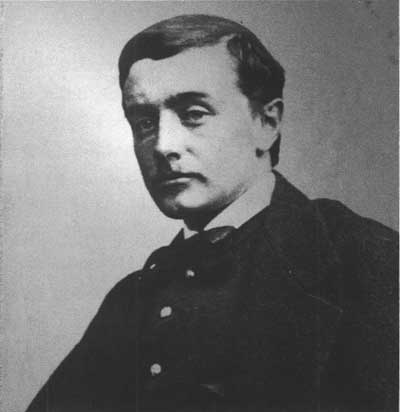
|
MAJOR HENRY LIVERMORE ABBOTT, 20TH MASSACHUSETTS INFANTRY (LETTER
REPRINTED FROM FALLEN LEAVES: THE CIVIL WAR LETTERS OF MAJOR HENRY
LIVERMORE ABBOTT, COURTESY OF KENT STATE UNIVERSITY PRESS)
|
|
As the Confederates neared the Union position, Brig. Gen. James L.
Kemper, whose brigade was on the right, stood in his stirrups, pointed
left with his sword, and shouted, "There are the guns, boys, go for
them!" With that and their closing left to fill gaps, Kemper's men
shifted across the front of Doubleday's division into Gibbon's sector.
When the Virginians sided from his front, Brig. Gen. George J. Stannard
ordered two regiments from his Vermont brigade to wheel right from its
position, about 500 yards south of the Copse of Trees, and march in
front of the Union line against the assault column's right. At the same
time, Union batteries on Cemetery Hill and infantrymen that had been
posted near the Emmitsburg Road beyond the column's left fired into the
Confederate flank and caused Heth's left brigade to head to the rear.
And so, as the assault column neared its objective, it took fire from
three sides. Three brigade commanders fell—Kemper and Col. Birkett
D. Fry with wounds, Brig. Gen. Robert B. Garnett killed. Division
commanders fared little better. Although Pickett emerged unscathed,
Pettigrew sustained a wound in the hand and Maj. Gen. Isaac R. Trimble,
commanding Pender's two brigades, lost a leg. The loss of Confederate
leaders in all echelons in the attack force would prove disastrous.
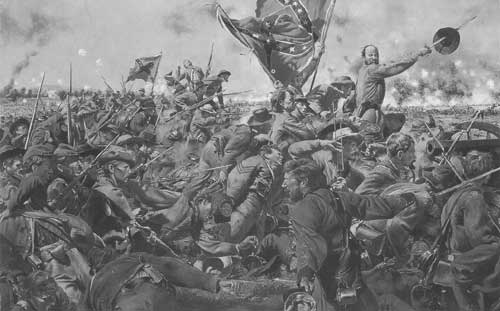
|
BRIGADIER GENERAL LEWIS ARMISTEAD LEADS CONDERATE SOLDIERS OVER
"THE ANGLE" (PAINTING BY DON TROIANI, PHOTOGRAPH COURTESY OF
HISTORICAL ART PRINTS, SOUTHBURY, CT.)
|
The attacking lines converged on the center, senior officers fell,
formations mixed, and the attackers lost cohesion and firepower. Yet
several thousand of them had reached the slope of the ridge and, in the
words of a Confederate officer, became a "mingled mass, from fifteen to
thirty deep." With leaders falling and formations melding, the
Confederates lost momentum and did not push the attack home. Instead,
they became a target that Union soldiers could not miss. Men of
Hancock's Second Corps, who had felt the Rebels' wrath when they
attacked Marye's Heights the previous December, took their revenge and
shouted "Fredericksburg" as they fired. Lt.
Alonzo H. Cushing, whose U.S. battery had
held the Angle and who had already suffered a serious wound, fell dead
when struck in the mouth by a bullet as he shouted for his guns to
fire.
It must have been about this time and amid all of this chaos that a
soldier in Armistead's brigade said, "What a sublime sight!" and then
looked at his watch and said that they had been "just nineteen minutes
coming." These were the last words he spoke. Not far away the right of
Pettigrew's line struck the Angle, and as it did a lieutenant from
Armistead's brigade walked to a Tennessee captain in Archer's brigade,
shook his hand, and said, "Virginia and Tennessee will stand together on
these works today!" Most of Heth's men who had come this far pressed
toward the wall north from the Angle and about 75 yards in its rear.
Brig. Gen. Alexander Hays's division of the Second Corps held this
sector. It was a strong position that the Confederates could not
reach.
Gen. Lewis A. Armistead held his hat aloft on his sword
and shouted, "Come on, boys, give them the cold steel!
Who will follow me?"
|
The Union position south from the Angle was more accessible and
vulnerable. Maj. Gen John Gibbon's division, the brigades of Alexander
Webb, Norman J. Hall, and William Harrow, held this portion of the
Union line, and Doubleday's division was on their left. Webb's brigade
and Cushing's guns manned the Angle. Brig. Gen. Lewis A. Armistead,
commander of Pickett's support brigade, pushed his way to the front of
the mass in front of the Angle, his hat held aloft on his sword, and
shouted, "Come on, boys, give them the cold steel! Who will follow me?"
Some men surged after him over the wall and into the area held by
Cushing's wrecked battery. Others pushed by the 69th Pennsylvania
Regiment into the Copse of Trees and against Capt. Andrew Cowan's New
York battery, which had taken position where
the Rhode Island battery had been south of the Copse of Trees. Cowan
shouted, "Double canister, at ten paces." Five of his guns belched their
cans of balls and swept the threat away.
As Cowan's guns blew away the Confederates in their front, so the
brigades of Hall and Harrow, which also were posted just south of the
copse, drove their attackers back. This done, they turned right toward
the penetration and helped Webb's brigade seal off and destroy the
bulge. (In later years men would call the area reached by the
Confederate surge "The High-Water Mark of the Confederacy," mark it with
a special monument, and protect the taller trees of the copse with an
iron fence.)
Thus it was that men of the nine shattered brigades that had set
off less than an hour before under the command of Pickett, Pettigrew,
and Trimble returned as individuals to Seminary Ridge. Sadly enough,
it was at this time that Brig. Gen. Cadmus M. Wilcox led his brigade
and the Florida brigade of Anderson's division against the Union sector
guarded by McGilvery's guns and the left of the Vermont brigade. They
had been ordered forward to guard Pickett's right, but by the time they
approached the Union line Pickett's right had been destroyed. A
"terrible fire of artillery" seared their lines, and the Vermonters
mowed against their left and rear. When he saw that his men were hurt "a
useless sacrifice," Wilcox ordered them back. So ended the grand
Confederate charge.
Nearly 5,600, over 50 percent, of the Confederates who had charged
became casualties; Union losses may have numbered about 1,500. General
Lee rode into the field of the charge to rally and console its
survivors. On meeting Lt. Col. Samuel G.
Shepard, commander of the remnant of Archer's brigade, he said,
"Colonel, rally your men to protect our artillery. The fault is mine,
but it will be right in the end."
|
|
